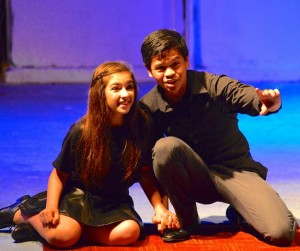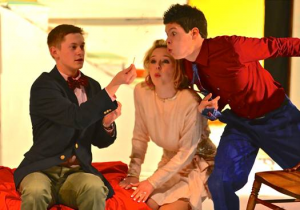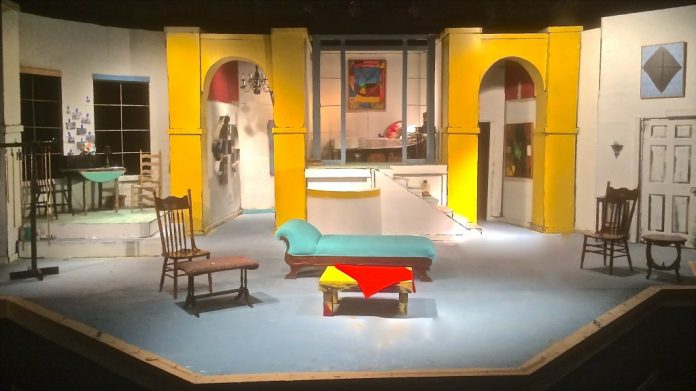The first two weekends of April showcased the impressive talents of the Jesuit and Ursuline theater departments as the lecture hall housed both a series of show tunes, the second annual Musical Revue, and a hilarious play, Black Comedy.
As the lights dimmed in the gallery, and the actors, all dressed in black garb, emerged from the dark hallways, Love, Loathing, & Music began with “Old Red Hills of Home,” performed by Sam Cormier ’17, which paints the picture of a Confederate soldier bidding farewell to his sweetheart as he goes to war. Subsequently, “What is this Feeling?” from Wicked, “Falling slowly” from Once, “A Little Priest” from Sweeney Todd, “A Whole New World” from Aladdin, “Forget About the Boy” from Thoroughly Modern Millie, “Mr. Cellophane” from Chicago, and “Finale B” from Rent were all beautifully performed by the extremely talented cast of musicians.
“What is this Feeling?” performed by Tess Jackson and Kaitlin Reynders, delves into the relationship of mutual “Loathing” between two roommates and the general favorability of Galinda, the good witch. Next, “Falling Slowly” from the play Once, performed by Alexis Farrell and Alejandro Rey-Hipolito ’16, demonstrates the struggling relationship of a street musician and a Czechoslovakian immigrant, likening their relationship to a sinking boat; Rey-Hipolito’s guitar performance greatly added to the impact of the meaning of the piece. Performed by the whole cast, “A Little Priest” illustrates the hard times of London in the nineteenth century, particularly as Mrs. Lovett, a pie vendor performed by Tess Jackson, and Sweeney Todd, a barber performed by George Rodriguez ’16, add the remains of their murdered victims to Mrs. Lovett’s meat pies in an act of irrational revenge against those who wronged Todd. “A Whole New World,” which was performed by Gino Piamonte ’15 and Alexis Farrell, truly astounded the audience. Renowned throughout Jesuit for his singing prowess, Gino Piamonte did not disappoint, and Alexis Farrell proved to be a truly talented vocalist. The rendition of the famous scene from Aladdin shed new light on the improbable relationship of the commoner, Alladin, and the Princess, Jasmine. “Forget About the Boy,” once again performed by whole cast, successfully inquires into the female mind as a cast of women discuss their past boyfriends. Senior Denis Alexander’s performance of “Mr. Cellophane,” which explored the life of the husband who feels neglected by his wife and analogizes himself to cellophane, had the audience snickering from the beginning as Alexander perfectly portrayed the abject sadness of the husband in his solo performance. To finish off the Musical Revue, “Finale B,” performed by the cast as a whole, tells the story of a group of struggling young artists in New York City as they attempt to band together to overcome their downtrodden status.
roommates and the general favorability of Galinda, the good witch. Next, “Falling Slowly” from the play Once, performed by Alexis Farrell and Alejandro Rey-Hipolito ’16, demonstrates the struggling relationship of a street musician and a Czechoslovakian immigrant, likening their relationship to a sinking boat; Rey-Hipolito’s guitar performance greatly added to the impact of the meaning of the piece. Performed by the whole cast, “A Little Priest” illustrates the hard times of London in the nineteenth century, particularly as Mrs. Lovett, a pie vendor performed by Tess Jackson, and Sweeney Todd, a barber performed by George Rodriguez ’16, add the remains of their murdered victims to Mrs. Lovett’s meat pies in an act of irrational revenge against those who wronged Todd. “A Whole New World,” which was performed by Gino Piamonte ’15 and Alexis Farrell, truly astounded the audience. Renowned throughout Jesuit for his singing prowess, Gino Piamonte did not disappoint, and Alexis Farrell proved to be a truly talented vocalist. The rendition of the famous scene from Aladdin shed new light on the improbable relationship of the commoner, Alladin, and the Princess, Jasmine. “Forget About the Boy,” once again performed by whole cast, successfully inquires into the female mind as a cast of women discuss their past boyfriends. Senior Denis Alexander’s performance of “Mr. Cellophane,” which explored the life of the husband who feels neglected by his wife and analogizes himself to cellophane, had the audience snickering from the beginning as Alexander perfectly portrayed the abject sadness of the husband in his solo performance. To finish off the Musical Revue, “Finale B,” performed by the cast as a whole, tells the story of a group of struggling young artists in New York City as they attempt to band together to overcome their downtrodden status.
As a whole, the Musical Revue perfectly portrayed Love, Loathing, & Music as its performances varied from stories of compassion to stories of hatred, all while exhibiting the great talent of the cast. Regarding the production of the Musical Revue, Mrs. Ann Morton, the co-director of the performance, explained that “the music selections of Love, Loathing, & Music are so powerful” that she and fellow co-director, Mr. Max von Schlehenreid, “opted to take a minimalist approach and to simply let most of the music performances stand on their own.” This not only compliments the great performances of the various students, but also explains the lack of a large number of props in the show.
After the cast of the Musical Revue was greeted by thundering applause, the curtains closed, and the lights dimmed as Black Comedy commenced. Set in a run-down mansion converted into an apartment during the 1980’s, Brindsley Miller, performed by Zachary Schutze ’15 on the first weekend of performances and John Jackson ’14 on the second, attempts to make his way from poverty to fortune through his art.  The set, constructed by the Jesuit Stagecraft class, features an elevated platform backed to a curved wall, an elevated bedroom with tall arches on either side, and a living room in the middle of the stage. As the play begins, the setting is completely dark. Brindsley and his fiancée Carol Melkett, performed by Madison Murrah and Meghan Harshaw, steal an assortment of extremely valuable furniture from their neighbor, Harold Gorringe (Joseph Duebner ’16 & Thomas Spottiswood ’14), as they attempt to spruce up the beaten down apartment to impress a wealthy art collector (Cameron Schutze ’17 & Zachary Watts ’17) and Melkett’s father (Brian Eisele ’14 & Marshall Baird ’15). As they do so, the couple attempt to find a cassette that Colonel Melkett will enjoy, and in doing so, a fuse is blown and the stage is immediately illuminated, revealing that the play operates under reversed lighting. Subsequently, a few unexpected visitors arrive at the apartment as the actors scramble through the “dark,” including Miss Furnival (Madeline Flores & Brittany Weirman), Gorringe himself, and Brindsley’s mistress, Clea (Adrian Collins & Grace Cunningham). From this point on, hilarity ensues as the audience can see what the characters cannot, and Brindsley struggles to keep his life from collapsing. Mr. Joe Howard, a co-directors of the show, analyzed the reversed lighting scheme of the play, explaining “the show’s twist–that when the characters first turn on the lights at the top of the show, the stage is cast into darkness, and then, when the power goes out, the stage lights come on–freed the cast to explore new levels of physical comedy.”
The set, constructed by the Jesuit Stagecraft class, features an elevated platform backed to a curved wall, an elevated bedroom with tall arches on either side, and a living room in the middle of the stage. As the play begins, the setting is completely dark. Brindsley and his fiancée Carol Melkett, performed by Madison Murrah and Meghan Harshaw, steal an assortment of extremely valuable furniture from their neighbor, Harold Gorringe (Joseph Duebner ’16 & Thomas Spottiswood ’14), as they attempt to spruce up the beaten down apartment to impress a wealthy art collector (Cameron Schutze ’17 & Zachary Watts ’17) and Melkett’s father (Brian Eisele ’14 & Marshall Baird ’15). As they do so, the couple attempt to find a cassette that Colonel Melkett will enjoy, and in doing so, a fuse is blown and the stage is immediately illuminated, revealing that the play operates under reversed lighting. Subsequently, a few unexpected visitors arrive at the apartment as the actors scramble through the “dark,” including Miss Furnival (Madeline Flores & Brittany Weirman), Gorringe himself, and Brindsley’s mistress, Clea (Adrian Collins & Grace Cunningham). From this point on, hilarity ensues as the audience can see what the characters cannot, and Brindsley struggles to keep his life from collapsing. Mr. Joe Howard, a co-directors of the show, analyzed the reversed lighting scheme of the play, explaining “the show’s twist–that when the characters first turn on the lights at the top of the show, the stage is cast into darkness, and then, when the power goes out, the stage lights come on–freed the cast to explore new levels of physical comedy.”
Throughout the farce, each character faces a series of obstacles that force him or her to change. These changes vary from Miss Furnival evolving from a teetotaler into a drunken mess, to Colonel Melkett transforming from a stern, hard nosed, and extremely sentimental officer who seems to know everything into a man completely puzzled by the occurrences of the room. As Brindsley attempts to return the stolen furniture to his neighbors room without allowing his visitors to discover his crimes, he weaves a web of lies that resulted in the audience keeling over in laughter for just about the whole play.
At the performance that I attended, John Jackson’s performance left the audience in an uproar of laughter for nearly two hours, as he perfectly portrayed the shady Brindsley. Also, Meghan Harshaw’s depiction of the almost painfully naive Carol and Brittany Weirman’s depiction of the drunken and uncontrollable Miss Furnival assisted in the amusement of the audience as a whole. Equally talented were the fellows who played Franz Schuppanzigh, a German electrician (Henry Ainsworth & Chris Ayres ’15).
The double feature of the Musical Revue and performance of Black Comedy was yet again another success for the quickly growing Jesuit Theater department. In addition to this, the series of performances allowed students to showcase their talents and spreading appreciation of the Theater department throughout the Jesuit community, including myself.
From another perspective, this double feature was a growing experience for many individuals, including performers taking on larger roles. Similarly, helping to direct his first play, Mr. Chris Patterson likened his experience of growth to the characters in the play, claiming that while he was first nervous and unaware of what the future would hold, he eventually “could see what the play should be – just like the characters steadily gain an understanding of everything going on in the scene around them.”
The Theater Program now looks forward to presenting their Spring One Acts later this year in the second week of May, and looks to recreate the success that this double feature and other past productions have achieved.






